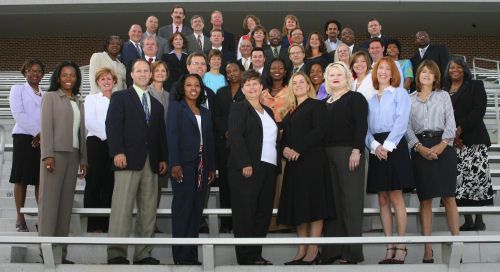Moore to Communication & Leadership
Recently, I was asked to contribute a piece on leadership for our Leadership Tallahassee (LT) community. It was an honor to do so and I am super grateful to Barbara Boone (LT Executive Director), the LT staff and volunteers, and the LT experience over the years – their efforts make our community better in so many ways. To say being a part of Leadership Tallahassee Class 24 (photo of our class included) made a huge difference in my life would be an understatement. In the ten plus years since class 24/7 graduated, I have grown and have learned lessons when it comes to authentic communication and respectable leadership (with more to learn, for sure).
With today’s technology and the unfettered access to information day and night, education centered on communication and leadership is only a click away. Personally, I value the exercise of both within a relationship building philosophy with individuals and teams. For me, it’s the day-to-day interactions where we give the benefit of the doubt, where we try our best with good intentions, where we commit to ethics and integrity, and where we don’t solely focus on who wins or loses or makes mistakes.
Authentic Communication

Want to maintain credibility as a leader? Are you consistently providing an open channel for engagement, communication and input for all members of your team? Do your team members know exactly where they stand in regard to their performance or your expectations?
Being authentic in communication isn’t always the easy thing to do – of course, nothing in leadership is for that matter. Over the years of working around LT classmates, I’ve gathered some helpful advice. First, saying what needs to be said is necessary and time and place are significant considerations before doing so. No matter how bad it needs to be said, there is no excuse for plain old meanness or inappropriateness. Second, whether you are a peer on an executive team or staff, everyone deserves to be heard and to be responded to – otherwise, we are telling them they are not valued. Responsiveness and common courtesy should be a constant from leadership, as well as consistent messaging and clear direction.
Professional growth can happen via direct, honest – and critical – conversations, but what will talking around corners do? How will someone improve/change their behavior if they are not aware of their expectations, wrongdoings, misperceptions, or misunderstandings? Build bridges and develop trust by utilizing authentic communication rather than feeding deceit and poisoning team chemistry.
Professional growth can also take place via sincere and meaningful recognition – sure, texts, emails, eCards, and social media posts are convenient avenues of complimenting a team member, but face-to-face delivery greatly benefits both parties involved. In those moments, expressing verbal respect as a means of recognition to teammates creates strong bonds and lasting relationships.
Respectable Leadership

It may seem over simplified, but I firmly believe we all know respectable leadership when we see it and the same goes for the opposite, unfortunately. Education on leadership is vast – from quotes to books to podcasts to consultants – and all varieties can make a difference in leadership abilities, but nothing takes the place of leading by example. You can post all the quotes, read all the books and listen to all the podcasts you want, but it comes down to earning leadership respect in all that you say and do – those two things can’t run opposite of one another. Being alongside LT classmates for years has afforded me great education!
Taking blame and giving credit, defending and supporting your team, inspiring and challenging others, and displaying principled and ethical behaviors – someone is always watching my friends and they do judge, let’s not kid ourselves. Maintaining respect and credibility as a leader is difficult if you are not willing to do the right thing and to hold others accountable, even if it means losing your seat on the bus. Remember, respect in leadership can take years to acquire, but only moments to lose.
Identifying as a “player’s coach” leader, I have tried to provide clarity in expectations, to build accountability with structure and process, to identify boundaries, and to deliver consequences when necessary. Simultaneously, success required not asking others to do something I wasn’t willing to do myself and taking time to get to know my team members. It’s a fact, the more you show people you care about them, the more they will do with you. Always support those you know are giving it their very best in effort, attitude and gratitude and do your best to temper the charismatic cheerleading role with a bit of humility – there can be a fine line between your intent of exuding confidence and the perception of arrogance.
Being a part of the Leadership Tallahassee community continues to make a difference in my life. Volunteering on committees, attending special events, and learning at workshops brings knowledge, relationships, and opportunities for growth in communication and leadership. Being authentic and being respectable in both requires constant improvement and grace. I sometimes wonder what kind of leader I would be if I had not participated in Leadership Tallahassee!


